#Duleba
Text
Mega Space Skinny Blonde Latina With Round BUTT Giving Amazing Ass Show to Spectators
Hot teen cunt gets fucked from behind
Pinay Scandal 2020 pangangabayo ni Tita (pt.4) Pinay MILF Cowgirl
Hardcore dick wanking with a young gorgeous twink
Gozando na novinha enquanto ela dorme
Irish pale teen thief talked dirty while punish fucked
Young Blonde Teen Step Sister And Step Brother Morning Bathroom Quickie
Novinha Crente Pagando Boquete pro Colega de Faculdade e tomando gozada na cara
Teen blonde Gets BBC Creampie
Foot fetish twink riding
#warehouseage#battologized#preparers#Lophiomyinae#habilable#formule#cheered#spekboom#Q.F.#forereach#inappetence#erythristic#longfin#Duleba#conceptus#soup#isogonic#pillwort#drawdown#trouserless
0 notes
Text
Chinese sissy Jelly Qiao masturbation
Lana Vianna mostrando o rebolado
Naughty girlfriend fucked hard at the GYM
Girlfriends Euro babes flashing in public facesitting pussy licking at home
Pussy for girls
Flexible slut forced anal and deepthroat
Emo big dick gay sex tube and hot twink boys kissing Christopher
Indian guy force fucked big ass
Ebony toilet piss voyeur
Medical Fetish Asians Jayrald and Vahn
#concento#hepatolytic#tritiate#Thinocorus#warehouseage#battologized#preparers#Lophiomyinae#habilable#formule#cheered#spekboom#Q.F.#forereach#inappetence#erythristic#longfin#Duleba#conceptus#soup
0 notes
Text
Duleba: az oroszok elhitték, hogy hadseregük legyőzhetetlen
Duleba: az oroszok elhitték, hogy hadseregük legyőzhetetlen
Csehszlovák Kém
– Aznap, amikor kitört az orosz háború Ukrajnában, telefonon beszéltünk és
megkérdeztem azt is, ön szerint Vlagyimir Putyin miért tette. Akkor azt mondta, hogy
nem tudja. Azóta több mint nyolc hónap telt el. Most már érti, hogy miért kezdett bele
az orosz elnök?
– Erre a kérdésre azóta sincs válaszom, mert a háború nyolc hónapja során a
hadművelet nem érte el azokat a célokat,…
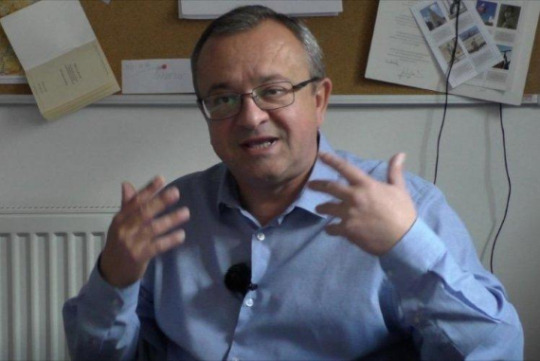
View On WordPress
0 notes
Text
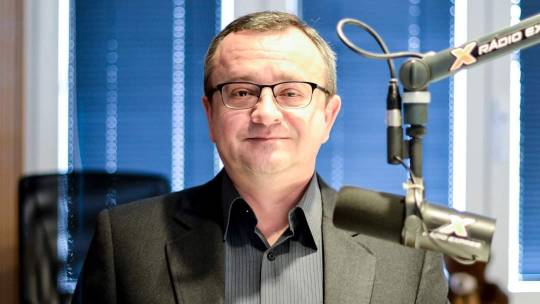
Duleba: az oroszok elhitték, hogy hadseregük legyőzhetetlen, de a háború fejleményei aláásták Putyin iránti hűségüket.
A mindent elsöprő magyarországi orosz propaganda elleni küzdelem jegyében lefordítottam Alexander Duleba, a Szlovák Külpolitikai Társaság elemzőjével az Aktuality.sk által készített interjút az orosz katonai agresszió jelenlegi helyzetéről és kilátásairól.
- Aznap, amikor kitört az orosz háború Ukrajnában, telefonon beszéltünk és megkérdeztem azt is, ön szerint Vlagyimir Putyin miért tette. Akkor azt mondta, hogy nem tudja. Azóta több mint nyolc hónap telt el. Most már érti, hogy miért kezdett bele az orosz elnök:
- Erre a kérdésre azóta sincs válaszom, mert a háború nyolc hónapja során a hadművelet nem érte el azokat a célokat, amelyeket Vlagyimir Putyin a háború előtt deklarált. Az első módosított cél Donbász "felszabadítása" volt - de Oroszország a mai napig "nem szabadította fel". Második cél Ukrajna demilitarizálása volt, ami jelenleg éppen fordítva néz ki: Ukrajna egyre több fegyvert kap. És a harmadik cél - Ukrajna náciementesítése - egy olyan propagandisztikus cél, amit maguk az oroszok sem tudnak megmagyarázni. E célok egyike sem teljesült tehát.
A háború megérkezett Oroszországba is. Szeptemberben legalább 300 ezer orosz állampolgárt mozgósítottak. Ez azt jelenti, hogy ezekből a családokból férfiak, apák, testvérek vonultak be a hadseregbe. És megérkeznek az első halottak. Ez nem egy ún. különleges hadművelet, ez egy klasszikus háború, amelyet Oroszország egyszerűen nem képes megnyerni. Ha nem tudta megnyerni az első héten, ezt már nem nyerheti meg. Maga Putyin is egy sarokba hátrált, amiből nem tud kijönni és nem lesz jó vége. Oroszországnak sem.
- Mit vár még Putyintól ezek után? Nem engedheti meg magának, hogy elveszítse a háborút, ezért egyesek úgy gondolják, hogy valami brutálisabb módszerhez folyamodhat.
- Nem szeretnék spekulálni, mert a háború kimeneteléről a harctéren döntenek, függetlenül attól, hogy Vlagyimir Putyin mit akar. Július harmadika óta az oroszok katonailag elakadtak és azóta sem mutattak semmit, ami arra utalna, hogy katonailag meg tudják nyerni ezt a háborút.
Ha az oroszok nem döntenek az Ukrajnából való kivonulásról, a háború folytatódni fog. Július után nincs más forgatókönyv. Még július végén pedig tárgyaltak a felek egymással, amikor az ukrán kormány felajánlotta az oroszoknak, hogy lemondanak a NATO-tagságról és Ukrajna területén hozzanak létre egy nemzetközi fegyverellenőrzési rendszert. Emellett azt kérték, hogy az oroszok vonuljanak vissza a február 23-i pozícióba és a Krím, illetve a két megszállt bábállam területén 12 év alatt mindkét fél lemond az erőszak alkalmazásáról és diplomáciai tárgyalássorozatot nyitnak meg. Az ukránok békeajánlatát azonban az oroszok meg sem hallgatták, hanem egyből elutasították és a háború folytatása mellett döntöttek. Azóta nem folytatott a két fél tárgyalásokat.
Ha arról beszélünk, hogy tömegpusztító fegyvereket is bevethetnek - sok szó esik taktikai atomfegyverről - az Amerikai Egyesült Államok és Nagy-Britannia válasza meglehetősen egyértelmű. Még ha taktikai atomfegyvert használnak, az sem segít nekik a fronton. Lehet, hogy elpusztítanak néhány ukrán várost, megölnek több tíz- vagy százezer embert, de a fronton ez semmit nem változtat. Az egész egy nagy tömeggyilkosság lesz.
A taktikai atom bevetése az az Amerikai Egyesült Államok és Nagy-Britannia válaszát is jelenti. Ismerjük ezeket, amiket a hivatalban lévő tisztviselők mondanak ki, hanem az Amerikai Egyesült Államok korábbi fontos képviselői. 1994-ben az Egyesült Államok és Nagy-Britannia Oroszországgal és Ukrajnával együtt aláírta a Budapesti Memorandumot, amely alapján Ukrajna átadta atomfegyvereit Oroszországnak. Az Egyesült Államok és Nagy-Britannia tehát leszerelte Ukrajna nukleáris készletét, és cserébe nemzetbiztonsági és területi garanciákat ígért neki. Ha Oroszország beveti nukleáris fegyvert vet be, ez egyben azt is jelenti, hogy bevonja a háborúba az Amerikai Egyesült Államokat és Nagy-Britanniát is. A két új háború fél nem atomcsapással fog válaszolni, hanem a hagyományos brit és amerikai légierő és haditengerészet támadása lesz Ukrajna 1991-es határán belül tartózkodó orosz csapatok, illetve a fekete-tengeri orosz hadiflotta ellen.
Ha Putyin szeretné, hogy az Egyesült Államok és Nagy-Britannia belépjen a háborúba, akkor taktikai atomot fog bevetni. Az ő dilemmája és döntése, hogy megteszi-e vagy sem. Elméletileg megteheti, de a választ már elég egyértelműen közölték. Szerintem ez elég erős érv ahhoz, hogy az oroszok, főleg tábornokaik nagyon visszafogottan döntsenek. A háború jelenlegi menete is azt mutatja, hogy az oroszoknak már gondot okoz az ukrán ellentámadás megállítása is, az Egyesült Államok és Nagy-Britannia háborúba lépése esetén Oroszország ukrajnai veresége csak felgyorsulna.
- Több interjúban is elmondta, hogy szerinte ez Vlagyimir Putyin számára a vég kezdete. Miért gondolja így?
- Mivel az oroszok nem tudják megnyerni ezt a háborút, ez egyben azt is jelenti, hogy vereség vár rájuk. A katonai vereség általában olyan következményekkel jár, hogy megváltozik az ország politikai vezetése is, mivel a háborúért felelős garnitúra befejezi. Putyin nem kivétel és nem is lesz kivétel. A háború nagyon kimerítő és gazdaságilag is legyengíti Oroszországot, az orosz gazdaság összeomlása még a szankciók miatt is jelentős lesz. A bezuhanás a becslések szerint 7 százalék körül mozog, de egyesek szerint idén 20 százalékos mértékben is bekövetkezhet.
Ha Európa ezen a télen nem fog annyi orosz szénhidrogént vásárolni olyan mértékben, mint korábban, akkor jövőre drasztikusan csökken az orosz állami költségvetés bevételei. Az oroszoknak nem lesz módjuk kompenzálni az eddig Európának eladott 200 milliárd köbméter bevételkiesést. Most sokkal kevesebb lesz belőlük és nem tudják eladni sem máshol, mert az infrastruktúra Európához kapcsolódik.
Az olajat az oroszok ugyan értékesítik más országoknak, de nagy veszteségekkel - csaknem harminc százalékos kedvezményeket adnak rá. Az olajeladásból tehát nem lesz annyi bevételük az olajeladásból, mint korábban. Röviden: jövőre mindez sokkal nagyobb erővel sújtja Oroszországot. Ugyanakkor Oroszországban tovább nő az elégedetlenség az értelmetlen háborúval kapcsolatban, és egyre több koporsó érkezik az országba halott orosz katonákkal.
Ez mind őrültség és értelmetlen dolog. Tudják, az emberek sok mindent elviselnek, de mindennek van határa és ennek átlépése pedig az elégedetlenség megnyilvánulását fogja jelenteni. Az oroszoknak nincs elegendő katonájuk, ezért kellett mozgósításba kezdeni. Az orosz közvélemény számára a háború többé nem egy televíziós műsor.
- Egyesek azonban úgy vélik, hogy Vlagyimir Putyin rezsimje a mozgósítás után is stabil. Azt is mondják, hogy Putyin az egész helyzetet a maga javára tudja majd fordítani és, hogy az utcán tiltakozó embereket erőszakkal elnyomják. Szóval, mit gondol, ön szerint mi lesz a fordulópont – a katonaság helyzete vagy az utcai demonstrációk?
- A Putyinba vetett hűség két alappillére is megrepedt. Az első pillér az oroszok elképzelése volt, hogy hadseregük legyőzhetetlen. A rezsim teljes identitása és propagandája erre az alaptételre épült. Az oroszok Putyinba vetett bizalma egyenesen arányos volt a legyőzhetetlen hadseregbe vetett mítosszal, és most kiderül, hogy ez a hadsereg vereségeket szenved. Putyin pusztán a mozgósítás elrendelésével beismerte, hogy a katonai helyzet a fronton nem úgy alakul számára, ahogy azt eltervezte. Bár Moszkva régóta azt állítja, hogy minden a tervek szerint halad, de ez egy szimpla hazugság. Ez volt az első eltört alappillér. Jelenleg minden orosz újraértékeli azt, amit évtizedek óta érzékelt a propagandában – az Oroszország felsőbbrendűségébe vetett hitet, a saját hadseregére és annak katonai erejére való büszkeséget.
A második eltört pillér az, hogy Putyin megszegte a nyilvánossággal kötött társadalmi szerződést. Ennek lényege az volt, hogy a lakosság alapvető szociális és gazdasági biztonságban részesül, és cserébe nem avatkozik bele a politikába és a politikai döntések meghozatalába. Ez volt a társadalmi felállás Oroszországban. Putyin valóban javított az ottani körülményeken Borisz Jelcin időszakához képest a helyi lakosság érzékelésében. Ez adta a rendszer legitimitásának alapját és ez volt az oroszok lojalitásának forrása iránta. Ez a lojalitás azonban felfeslett, megszakadt, mivel az általános helyzet a háború miatt romlik. A Szovjetunió és a kommunista rezsim is örök életűnek hirdette magát, és senkinek fogalma sem volt arról, hogy néhány napon belül összeomolhat. Ne zárjuk ki ezt a lehetőséget Vlagyimir Putyin rezsimjének esetében sem. Röviden tehát, a putyini rezsim két alappillére megsérült, ennek előbb utóbb eredménye lesz, de biztosan be fog köszönni.
- Évek óta követi az orosz eseményeket, Oroszországot. Meglepte önt az orosz hadsereg állapota? Azt mondták róla, hogy látványosan fejlődött, de most valami egészen más látunk a frontokon. Számított arra, hogy így fog kinézni?
- Nem számítottam erre. Azok közé tartoztam, aki elhitte, mert Oroszország az elmúlt években évente több mint 70 milliárd dollárt fektetett a hadseregbe. Hadseregreformot kellett volna végrehajtani. Mindenki, köztük én is azt vártam, hogy a reformok megerősítik a hadsereget, hatékonyabbá teszik a parancsnokságot, minőségileg javul a fegyverzet. De kiderült, hogy Oroszországban akkor a korrupció, hogy a pénz egy része nem a hadseregbe, hanem egészen máshol kötött ki. De ez minden központosított, totalitárius állam esetében probléma - minden ilyen államban olyan árnyékkorrupciós sémák épülnek ki, amelyeket nem lehet ellenőrizni.
Putyin nagyban hirdette magát, hogy ő egy szuper uralkodó, aki mindent megold, és most kiderül, hogy hatalma egy rothadó, korrupt rendszeresen alapul. És ezt láthatjuk az orosz hadsereg állapotában is.
Szeptember óta abban látunk változást, hogy az oroszok mit képesek még bevetni a háborúban. Elfogynak tankjaik. Ugyanez vonatkozik a tüzérségi lőszerre és a modern harci helikopterekre is. Modern fegyvereik nagy részét már felhasználták, a raktárakból régebbi, gyenge minőségű eszközöket tudnak csak elővenni. Miközben Ukrajna egyre több modern és nagy pontosságú fegyvert kap az oroszok kifogynak a lőszerekből, a modern fegyverekből és a csúcstechnológiás rakétákból is. Ezek azok a folyamatok, amelyek világosan az orosz hadsereg egyre nagyobb kimerüléséről adnak bizonyítékokat.
- Említik, hogy Putyin képes lehet akár egymillió katonát mozgósítani. Ha ez elméletileg megtörténne, az segítene Oroszországnak a háborúban?
- A katonákat fel kell tudni fegyverezni. Tudjuk, hogy az oroszoknak már most gondjuk van a logisztika biztosításával csapataik felé. A frontra küldött újoncok egy régebbi típusú Kalasnyikovot kaptak géppuskaként, míg az orosz csapatok általában egy másik, modernebb típust használnak, és már most gondot okoz a lőszer beszerzése. Bár a katonák ereje és létszáma fontos dolog, de ez nem elég összességében. A jelenlegi fegyverrendszerek világában már a sikerhez már technológiai és nagy pontosságú modern fegyverekre van szükség, különben a halálos áldozatok száma fog emelkedni. És ezt láthatjuk most. Napról napra nő az elesett és sebesült oroszok száma.
A magas halálozás annak a következménye, hogy felkészülés nélkül küldik a mozgósított újoncokat a frontra. Láttam egy interjút két elfogott burjáttal, akiket mozgósítottak, és rá egy hétre már ukrán fogságban voltak. Esélyük sem volt felkészülni. Miközben minden harci felkészülést képzéseken és gyakorlaton kellene megtanulni. Az ilyen felkészületlen emberek nem helyettesíthetik a felkészült katonákat.
- Mi a helyzet a fehérorosz hadsereggel? Ha Fehéroroszország aktívan – katonákkal – csatlakozna a háborúhoz, változtathat-e bármin vagy sem?
- Nem gondolom, hogy csatlakoznak, mert a fehérorosz hadsereg 17 ezer fős. És ha mozgósítottak is valakit, akkor is maximum 30-40 ezer emberről beszélhetünk, akit háborúba tudnának küldeni. És főleg - az ukránokban megvan a harci akarat. Egy friss felmérés szerint az ukránok 86 százaléka nem akar semmilyen tárgyalást Oroszországgal. A nagy többség amellett áll, hogy az oroszok Ukrajna teljes területét elhagyják.
A közvélemény szempontjából nincs indíték háborúba menni. Az emberek nem is értik, hogy valójában miért is háborúznak. Nincs okuk vagy indítékuk. Miközben az ukránok igazságos háborút vívnak és megvédik területüket a megszállástól – ennyi sokak számára a történet. Alapvetően szemtanúi vagyunk annak, hogyan hoz létre Putyin egy politikai nemzetet akaratán kívül. Ha látjuk az ukrán katonákkal készült interjúkat, akik közül sokan oroszul beszélnek, mert oroszul beszélő ukránok, de Ukrajnáért harcolnak. Ők tudják, milyen okból harcolnak és mi a harcuk célja. A fehéroroszok egyáltalán nem tudják, miért kellene harcolni ebben a háborúban, az oroszoknak pedig kétségeik vannak afelől, hogy mire jó ez az egész háború. Tiszta őrület.
- Végül azt is mondják, hogy Putyin legújabb fegyvere a hideg - megpróbálja kiéheztetni és megfagyasztani az ukránokat. Hogyan befolyásolhatja a tél a fronteseményeket?
- A frontot a hideg még egyáltalán nem befolyásolja. Természetesen csökkenti az emberek komfortérzetét. És problémákat fog okozni, de nem úgy, hogy az oroszoknak sikerül kilőni az ukrán energiaipart. Az oroszok nem képesek hatalmas támadásokra, nem tudnak naponta száz rakétát kilőni. Előfordulhat, hogy az ukránok nagy része a téli hónapokban a nyugatra vándorol, ahogy azt feltételezzük. Ha gondok lesznek az áram-, hő- és vízellátással, akkor nagy valószínűséggel megnő a migráció. Természetesen nem 14 millió ember fog útrakelni, mint a háború első hullámában, ugyanakkor ma már a tagállamok képesek nagyobb mennyiségű ukrán menekült befogadására is, mint a háború első hónapjaiban. De azt nem gondolom, hogy mindez alapvetően megváltoztatná a háború menetét. Arról ugyanis a fegyverek és a harci elszántság fog dönteni és mindenekelőtt a parancsnokság minősége. Ez pedig két kategóriával magasabbnak tűnik az ukránoknál, mint az oroszoknál.
(Fényképen: Alexander Duleba, Youtube)
#SlavaUkraini
129 notes
·
View notes
Text
Despite heated debate over the methodology used in the survey, experts are not shocked by the latest findings.
A recently published survey that showed a significant number of Slovaks want Russia to win the war in Ukraine has sparked huge controversy in the country.
Jakub Goda, a noted disinformation fighter, was among the first people to share his initial scepticism over the survey, published on September 14, and to ponder why it had to be wrong in light of previous research that had told a different story.
In a Facebook post, Goda alluded to data published by the Bratislava-based think-tank Globsec in May. Despite the strong presence of Russian propaganda in the country’s media landscape, the data found that more than 50 per cent of Slovaks blamed Russia for the war in Ukraine, 62 per cent of Slovaks perceived Russia as a threat, and 72 per cent supported NATO in late March.
“I just can’t admit it’s even darker than I thought, so I’m speculating and looking for excuses,” Goda wrote on Facebook, as he questioned the 10-point scale used and even the polling agency itself that carried out the survey.
The polling agency in question was MNFORCE, which together with the Slovak Academy of Sciences (SAV) produced the latest “How Are You, Slovakia?” survey. Over the last two years, this survey has sought to map Slovaks’ attitudes shaped by the COVID-19 pandemic and the war in Ukraine. The polling agency asked 1,000 respondents 54 questions via the internet on July 18-22, of which two questions concerned Russia’s war against Ukraine.
As soon as the Denník N daily on September 14 published its analysis of one of those two questions, “How would you like the war to end?”, the polling numbers caused a huge uproar. As well as heated debate on social media, several foreign news outlets also shared the numbers on their websites.

According to the survey, 20.6 per cent of respondents said in July that they would definitely want Russia to be the clear winner of the war compared to 19.9 per cent of respondents who said the same about Ukraine.
Yet it was the 1-10 rating scale used in the survey, which researchers employed to evaluate to what extent respondents might wish for a victory by Ukraine or Russia in the war, that has divided people the most.
To dismiss any doubts about the survey, whose findings in its entirety will be published in several months, Denník N journalist Daniel Kerekes followed up on his analysis and published an interview with SAV sociologist Miloslav Bahna, one of the survey’s authors.
While Goda has accepted Kerekes’ 13-point Facebook explanation concerning the survey and Bahna’s defence of its results, Ukraine expert and prime ministerial advisor Alexander Duleba took a different line.
“The survey has no informative value,” Duleba told Rádio Expres, the most listened to radio station in the country, in his criticism of the applied methodology.
Yet information security expert Tomáš Kriššák from the Gerulata Technologies firm disagreed and said he considers the survey to be a warning sign. “Information security has been underestimated in Slovakia for a long time,” he said.
Most or many Slovaks?
Experts underline that polling is not an exact science and that surveys paint a picture of a situation at the particular time when they are undertaken.
In the weeks leading up to the survey, Russia was faring better than Ukraine in the conflict even though Ukraine continued to receive weapons from the West. NATO had invited Finland and Sweden to join the alliance and agreed to expand troops at high readiness. And a political crisis in Slovakia and the war-induced energy crisis were beginning to appear more frequently as topics in the media. All these news stories, in addition to Russian propaganda and pro-Russian views held and presented by some high-profile Slovak politicians like former prime minister Robert Fico, could have been shaping respondents’ views one way or another.
Looking at the rating scale and the mathematical results, up to 52.1 per cent of respondents (1-5) said they wish for a Russian victory, while 30 per cent (6-10) said they hope Ukraine will win. Almost 18 per cent said, “I don’t know”.
Among the people who expressed most support for Russia in the survey were those who remain unvaccinated, support far-right parties or the former ruling party Smer, and are less educated.
Surprisingly, respondents in their 30s held the strongest pro-Russian views, according to the published data. It is usually Slovak pensioners who have the highest sympathy for Russia.
Bahna, who stands behind his decision to use the 10-point scale despite the criticism, has said he defines the values from 4 to 7 as the in-between/neutral position. “In the case of the asked question, it would mean a wish for a tie between Russia and Ukraine,” the sociologist said.
Hence, the percentage of respondents wishing for a Russian victory (1-3) would stand at 32.4 per cent. Conversely, 25.5 per cent would represent the respondents (8-10) who would want Ukraine to defeat Russia.
If the 4-7 values and the “I don’t know” percentage were totted up, it would mean that 42.1 per cent wish for a tie or have no interest in the war.
Experts such as Václav Hřích, head of the AKO polling agency, and Dominika Hajdu from Globsec see a problem in the use of the detailed rating scale, they told the Markíza television channel. Hřích said he would have preferred a simpler scale, while Hajdu pointed out that Slovaks tend to mark “5” instead of “I don’t know” in surveys to avoid admitting that they do not know the answer. Yet “5” does not represent a neutral number mathematically, something which people might forget when filling in a survey.
Moreover, before respondents answered the question of who they think should win the war, they had to answer the question on how the war should end. “The opinion that Russia would win significantly prevailed,” Bahna revealed to Denník N.
He also admitted that some respondents could have overlooked the difference in the meaning of the second question. “However, most answers are not identical,” he emphasised.
The sociologist also defended the method employed of online polling even if people without internet access had been excluded from the survey. After two years of applying the methodology and comparing it with others, he said the differences are negligible.
As for the quality of respondents who are rewarded and used by MNFORCE, researchers behind the survey said the polling agency is a member of ESOMAR, an organisation that advocates for the ethical and responsible use of data in analytics and research.
Another criticism raised by some on social media concerned MNFORCE owner Andrej Kičura, who is related to Kajetán Kičura. The latter is a former high-ranking civil servant who is facing charges of corruption and manipulation in public procurement.
“It’s a coincidence,” said Juraj Caránek from Seesame, a PR agency involved in the “How are you, Slovakia?” surveys. Kajetán Kičura has nothing to do with MNFORCE and does not pay for the surveys, he stressed.
Propaganda and national egoism
More than seven months into the war in Ukraine, the conflict has transformed from a reality that scared Slovaks and sparked solidarity with its refugees into a polarising political topic.
Soon after the invasion began, MNFORCE and SAV conducted a quick survey on whether Slovaks agreed with their government’s condemnation of the invasion: 78.2 per cent supported the decision, though only 42 per cent were fully convinced the decision was right. When respondents were asked about Slovakia’s geopolitical orientation in April, 46 per cent said Slovakia should stay neutral between Russia and the West. Only 8 per cent said Slovakia should take the side of Russia, and the number of those who would rather stand by the West had increased to 39 per cent from 26 per cent in 2014.
Yet the initially encouraging numbers and solidarity seem to be reversing. For example, refugees are now increasingly seen as a burden on Slovak society.
Since the start of the war, researchers have also asked the question “Who is to blame for the war?” In March, 76 per cent of 1,851 respondents blamed Russia. That number had dropped to 68 per cent in August, online polls by SAV and two universities in eastern Slovakia showed.
“Even in this case, it is not clear that the majority of the public would be strongly convinced that only Russia is the aggressor,” Bahna told Denník N.

Kriššák is not surprised by the declining support for Ukraine in such a polarised society as Slovakia’s. The Slovak information space has been under the control of Russian propaganda spreaders for a long time, he noted.
Slovakia is one of the most vulnerable countries to conspiracy theories in the region, according to this year’s Globsec report. Back in May, members of the US Congress wrote a letter to Facebook to do more to fight disinformation on the Slovak-language version of Facebook.
“The control of the narrative also translates into the formation of public opinion and how people think about and frame current events,” Kriššák said.
Other experts share this view. Hajdu from Globsec said she wasn’t particularly shocked by SAV and MNFORCE’s latest findings either. As she told Markíza, about a third of Slovaks seem to be Russophiles no matter what happens.
Political analyst Grigorij Mesežnikov, on the other hand, described the findings as the broken moral compass of Slovaks. “Overlooking what’s happening in Ukraine, caring only about energy prices and pointing to problems that the war brings about for Slovakia is national egoism,” the political analyst said.
The ex-Slovak finance minister and a former advisor to Ukrainian politicians, Ivan Mikloš, went even further in an op-ed for the Sme daily, in which he wrote that Slovaks who wish for a victory to Russia do not really consider Slovakia their home.
“If our home, our homeland and values such as freedom, independence, our territorial integrity are important to us, then we understand their importance and sanctity not only in the event of them being threatened at home, but also everywhere else, even more so in the neighbouring country,” he wrote.
2 notes
·
View notes
Link
Today marks the one year anniversary of the strike against the Pittsburgh Post-Gazette. We honor this day by interviewingn one of the employes who is also heavily involved in the union. "I’ll never be the same. I’ve been irrevocably changed by the strike, in mostly good ways. But only people who have been on strike like this can understand the ways that it affects and changes you. I’m grateful that I am among such incredible people, and that we can support each other the way that we do. You cannot survive a strike by yourself. Solidarity goes much deeper than you can imagine, until you’re out on the line like this."
0 notes
Text
11 Silent Signs You Have PCOS
Polycystic Ovary Syndrome (pcos) | Symptoms, Diagnosis & Treatment Options
Evanthia Diamanti-Kandarakis-Jean-Pierre Bourguignon-Linda Giudice-Russ Hauser-Gail Prins-Ana Soto-R. Zoeller-Andrea Gore – https://www.ncbi.nlm.nih.gov/pmc/articles/PMC2726844/
Antoni Duleba-Anuja Dokras – https://www.ncbi.nlm.nih.gov/pmc/articles/PMC3245829/
Vinegar Improves Insulin Sensitivity To a…
View On WordPress
0 notes
Photo
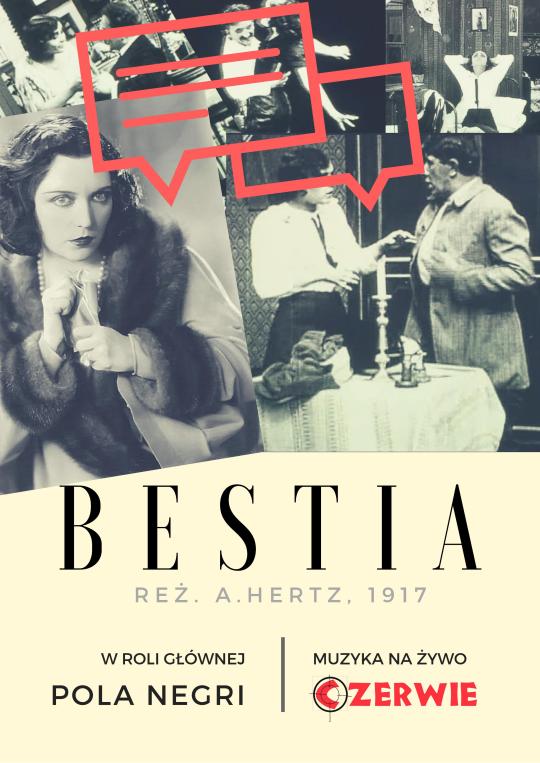
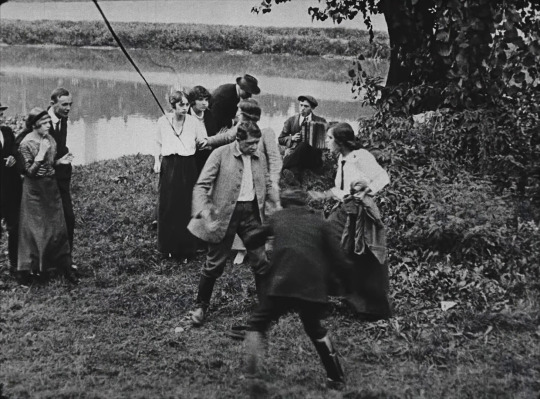
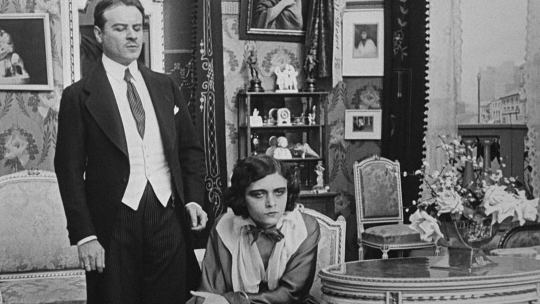
The Polish Dancer (Bestia) (1917) Aleksander Hertz
February 4th 2022
#the polish dancer#bestia#1917#aleksander hertz#pola negri#witold kuncewicz#maria duleba#jan pawlowski#beast
3 notes
·
View notes
Photo
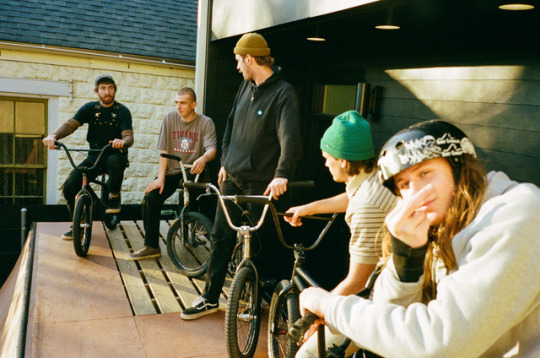

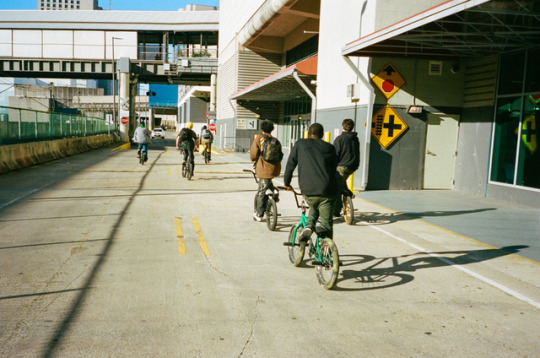
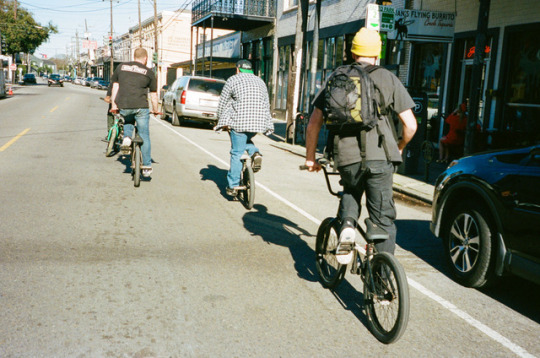

Sessions, New Orleans 2019
www.ootibilleaud.com
0 notes
Text

Wywiozłem ją do lasu i ustrzeliłem.
mod: Anna Krupczyńska
Mua: Adrianna Duleba
1 note
·
View note
Link
We need to do some more research into this but this study would seem to imply that the addition of a very small amount of this to your diet would amplify the efects of Testosterone at the receptor level.
jb
==============
Triclocarban enhances testosterone action: A new type of endocrine disruptor?
Jiangang Chen, Ki Chang Ahn, Nancy A. Gee, Mohamed I. Mohamed, Antoni J. Duleba, Ling Zhao, Shirley J. Gee, Bruce D. Hammock, and Bill L. Lasley*
Center for Health and the Environment (J.C., N.A.G., B.L.L), Department of Entomology (K.C.A., S.J.G., B.D.H), California National Primate Research Center (N.A.G., B.L.L.), Division of Reproductive Endocrinology and Infertility, UCD Medical Center (A.J.D.), Department of Nutrition (L.Z), Cancer Research Center (B.D.H.), University of California, Davis, California 95616 and Department of Obstetrics and Gynecology (M.I.M., A.J.D.), Yale University School of Medicine, New Haven, Connecticut 06510
* To whom correspondence should be addressed. E-mail: [email protected].
Many xenobiotics have been associated with endocrine effects in a wide range of biological systems. These associations are usually between small non-steroid molecules and steroid receptor signaling systems. In this report, triclocarban (TCC; 3,4,4'-trichlorocarbanilide), a common ingredient in personal care products that is employed as an antimicrobial agent was evaluated and found to represent a new category of endocrine-disrupting substance (EDS). A cell-based androgen receptor-mediated bioassay was used to demonstrate that TCC and other urea compounds with a similar structure, which have little or no endocrine activity when tested alone, act to enhance testosterone (T) induced androgen receptor-mediated transcriptional activity in vitro. This amplification effect of TCC was also apparent in vivo when 0.25% TCC was added to the diet of castrated male rats that were supported by exogenous testosterone treatment for ten days. All male sex accessory organs increased significantly in size following the T+TCC treatment compared to T or TCC treatments alone. The data presented here suggest that the bioactivity of endogenous hormones may be amplified by exposure to commercial personal care products containing sufficient levels of TCC.
2 notes
·
View notes
Photo
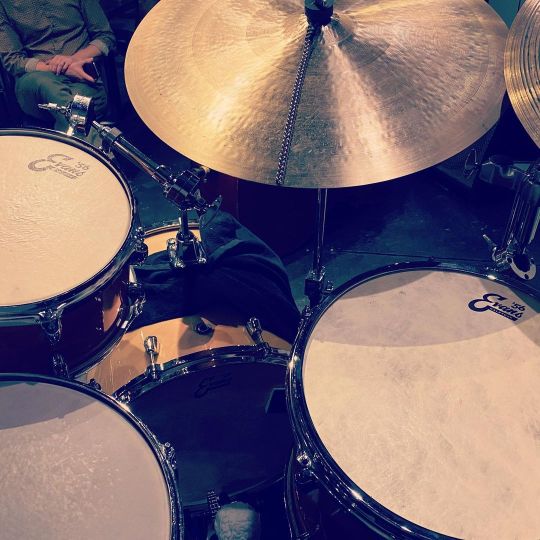
Fun Night at Eden on the River with my trio, featuring Derek Duleba & Wesley Morgan. One of my drumset NIU students showed up and sat in with the trio, yeah Noah! Sounding great! 👏🏽👏🏽👏🏽🥁☯️👊🏽 (at Eden Restaurant & Events) https://www.instagram.com/p/CTrwa3erQ0A/?utm_medium=tumblr
0 notes
Text
OUT & ABOUT: THE 31ST ANNUAL AIDS WALK MIAMI
By Rafa Carvajal | Photos provided by Care Resource
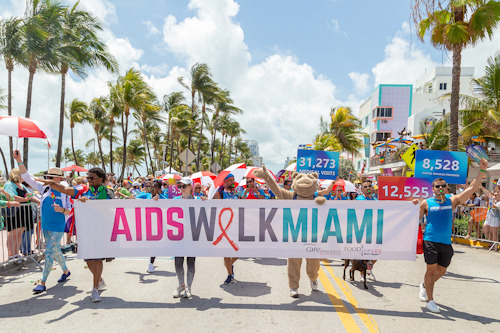
Care Resource will be hosting the 31st Annual AIDS Walk Miami on April 28, 2019, to be held at Soundscape Park in Miami Beach. AIDS Walk is one of Care Resource's most successful fundraising programs in South Florida, helping raise money to continue providing our local community with access to HIV/AIDS prevention, testing, and primary medical and dental care, as well as its Food For Life Network Food Bank that provides 17,000+ individuals with food and nutritional assistance, and more. According to this year's Master of Ceremonies, U.S. Representative Donna Shalala, "It is an honor to serve as the Master of Ceremonies for AIDS Walk Miami on April 28 at Soundscape Park in Miami Beach. Advances in treatment and new prevention strategies have now made 'Getting to Zero' – zero new infections, zero deaths, zero stigma – an achievable goal! Getting to zero still requires the efforts of everybody. Participation is critical to increasing awareness, fighting stigma, and raising funds to support the most vulnerable people living with HIV/AIDS in South Florida. Let's make an impact together." Join Shalal, who represents Florida's 27th Congressional District, for the 5K walkathon fundraiser.
Wire Magazine sat down with the team at Care Resource to find out what's in store for this year's AIDS Walk Miami.
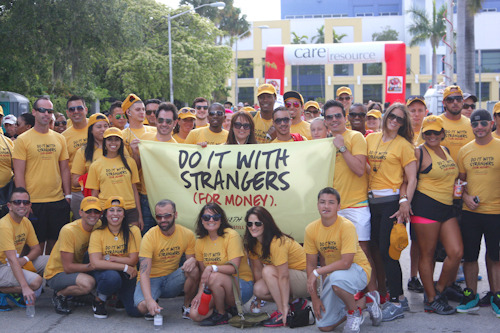
Rafa Carvajal: Tell our readers about this year's AIDS Walk Miami.
Jonathan Welsh: The 31st annual AIDS Walk Miami begins and ends at the beautiful SoundScape Park located at 17th Street between Washington and Drexel Avenue. SoundScape is an urban park in the cultural and civic heart of Miami Beach that captures the spirit and vitality of the City adjacent to the New World Center. Registration and Opening Ceremonies begin at 8 a.m. and the Walk begins promptly at 9 a.m. (rain or shine). AIDS Walk Miami follows a course through Lincoln Road Mall, the South Beach residential neighborhood, the Washington Avenue business district, Lummus Park serpentine pathway along Ocean Drive and the Ocean boardwalk. Congresswoman Donna Shalala is serving as master of ceremonies. During the post-walk ceremony, there will be a community health fair with a variety of activities including free wellness screenings, HIV testing, carnival games, and giveaways. Stage music will be provided by Palo Santo Music – a Miami-born band playing Latin rock, cumbia, funk and reggae in an original tropi-rock style.
RC: Why is participating in the Walk important?
Lazaro Vigoa: When it comes to HIV treatment, so much has changed since 1981 and more changes hopefully lie ahead. Participating in AIDS Walk Miami is extremely important – we must keep raising awareness about the disease. A disease that was once an epidemic, one that claimed many lives of the LGBTQ community in the early '80s and '90s. As a member of this diverse community myself, I believe that this walk does not only honor the lives of those who passed away from the disease but is also a great symbol of the strength and endurance for our community.

RC: With such progress, is HIV/AIDS a thing of the past?
LV: Absolutely not. Despite progress in treating the disease and a decline in new infections among some demographics, HIV/AIDS is not a thing of the past; there is still a lot of stigma around the disease. Thankfully, we have more knowledge and resources than previous generations, but the thought of getting tested is still a very delicate subject to many. I am a firm believer that this generation can be the one to end the epidemic. The first step is recognizing that HIV/AIDS is not a public health problem from the past, but an urgent human rights issue that impacts every aspect of a person's life, especially those already affected.
RC: What does Care Resource hope to accomplish with AIDS Walk Miami this year?
Claire Duleba: We want to reignite awareness of the continuing HIV epidemic in South Florida. Although major cities like San Francisco and New York have managed to significantly lower their infection rates, we remain the epicenter for new HIV infections in the United States. AIDS Walk Miami is a great opportunity to not only let everyone know that HIV is still significantly impacting our community, but also highlight the tools we have now to halt this epidemic. We have PrEP (pre-exposure prophylaxis), a daily pill that significantly lowers the risk of being infected by HIV when taken daily. When HIV-positive individuals are on stable treatment plans, their viral load can be decreased to undetectable levels, ensuring that they cannot transmit the virus to others. By using both PrEP and getting all HIV-positive individuals into treatment, we can prevent new HIV infections. But we need to make sure that everyone knows about these tools, and gets the treatment they need!

RC: How do funds raised during AIDS Walk Miami help South Florida's community?
JW: Funds raised from AIDS Walk Miami go to Care Resource and its Food For Life Network Food Bank to continue providing critical help to the 17,000+ individuals annually who depend on its essential services: primary medical and dental care, HIV and STI testing, case management, counseling, prevention education, housing, food and nutritional assistance, and much more. Moreover, it is instrumental in providing the infrastructure to link those individuals newly diagnosed with HIV or returning to care on the same day. AIDS Walk Miami ensures that resources are available for one to start medicine immediately – which lowers the amount of virus in the blood. When people with HIV start treatment and become undetectable, their chance of transmitting the virus becomes virtually zero. It is also instrumental in providing the infrastructure for Care Resource to offer free, confidential HIV counseling and rapid testing to everyone at our offices or through mobile units at several community locations.
RC: Are there any other events taking place during AIDS Walk Miami?
Steve Beko: Every year, our sponsors, teams, and community come together to create some very unique fundraisers that are tied in with the Walk. There are pool parties, liquor tastings, dinners, and lunches. Just our team alone has several tropical themed lunches, dress down days offered daily or weekly, bake sales and even virgin happy hours at our varied health centers. Some of our sponsors host events from team signups to special drinks or other products that benefit the Walk. One of our longest running events that occurs each year with the Walk is the Churches in the Grove – Mini Walk, which is held each year the Saturday prior to the AIDS Walk, this year on the 27. These guys rock it out in the Grove and have an amazing turnout. I just love the creativity each year and all amazing people I meet that support the Walk in their own unique way.
This was originally published in Wire Magazine Issue 9.2019
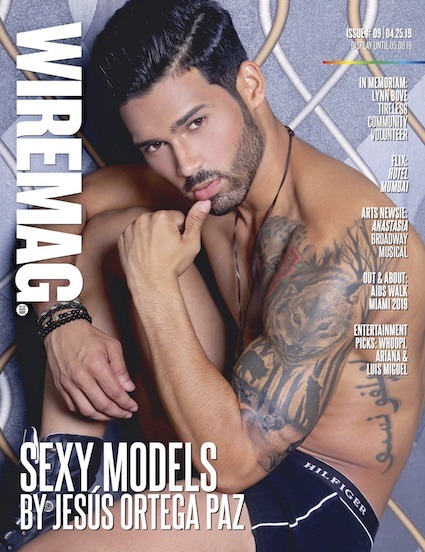
#wire magazine#wiremag.com#wire#miami#miami beach#sobe#fort lauderdale#wynwood#gay#lgbt#glbt#wilton manors#south beach#AIDS Walk Miami#Care Resource
0 notes
Video
youtube
Liked on YouTube: #TCH16 - Livia Duleba (2nd round) https://youtu.be/EJv20hcD8-8
0 notes
Text
Who’s in the Tchaikovsky flute finals
Who’s in the Tchaikovsky flute finals
They’ve just published the list:
Duleba Livia / Hungary
Demin Matvey / Russia
Molletones Etni / Venezuela
Viland Sofiya / Russia
Saito Shino / Japan
Chernyshov Fedor / Russia
Kim Brian / Australia
Vodovozova Aliya / Russia
Marinesku Alexander / Russia
Yu Yuan / China
Blanco Lewis Joidy / Venezuela
Kim Seohyeon / South Korea
source https://slippedisc.com/2019/05/whos-in-the-tchaikovsky-flute-fin…
View On WordPress
0 notes
